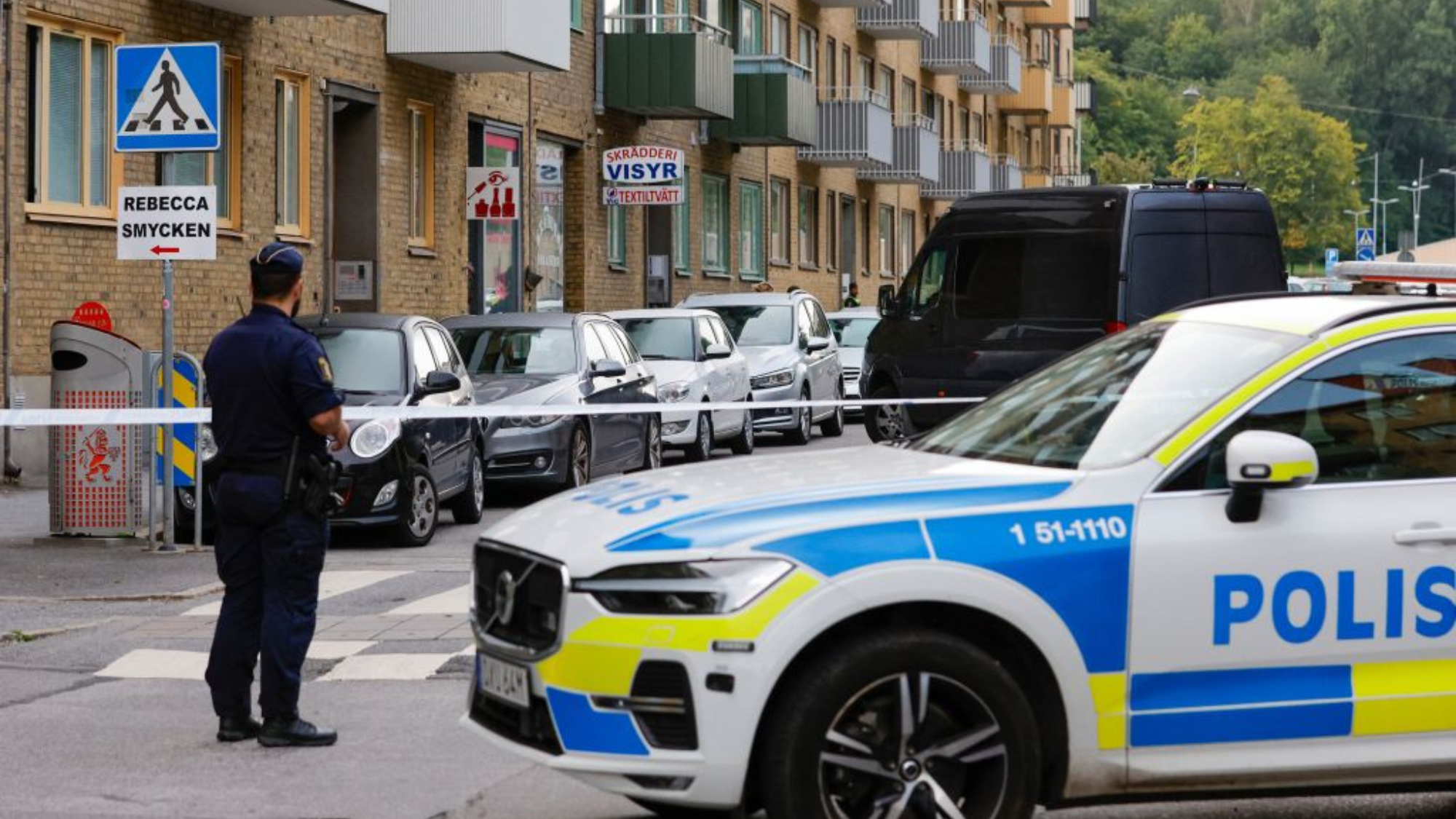Gangs, guns and bombs: Sweden's 'crisis of violence'
Surge in bomb attacks and gun violence has led government to call on military support

A free daily email with the biggest news stories of the day – and the best features from TheWeek.com
You are now subscribed
Your newsletter sign-up was successful
Apartment blocks blown apart by bombs; video footage of a teenage boy being "executed" by gunmen – these are the kinds of atrocities you might expect in war-torn Syria, said Peter Wennblad in Svenska Dagbladet (Stockholm).
Yet they're happening right here in Sweden: the country is experiencing a "crisis of violence" that is taking on the characteristics of civil war. Bomb attacks are a regular occurrence: 134 so far this year, up from 90 in all of 2022. Gun violence has soared to levels unheard of in other European states: 62 people died in shootings in Sweden last year, a per capita gun-murder rate roughly 30 times higher than London's.
Things are so bad that the prime minister, Ulf Kristersson, has called in the army to help stop the bloodshed. "No other country in Europe is seeing anything like this," he said in a TV address last month.
The Week
Escape your echo chamber. Get the facts behind the news, plus analysis from multiple perspectives.

Sign up for The Week's Free Newsletters
From our morning news briefing to a weekly Good News Newsletter, get the best of The Week delivered directly to your inbox.
From our morning news briefing to a weekly Good News Newsletter, get the best of The Week delivered directly to your inbox.
A 'self-inflicted nightmare'
This mayhem is the product of "turf wars for control of the drug trade, driven by an influx of guns, personal vendettas and a pool of available youths, many from marginalised migrant communities", said Sune Engel Rasmussen in The Wall Street Journal (New York). Gangs like those run by Rawa Majid, the notorious ringleader known as the "Kurdish Fox" who came to Sweden from Iraqi Kurdistan as an infant and now controls his drug empire from Turkey, are "beyond the reach of prosecutors". Such gangs have rendered entire neighbourhoods no-go areas for the police.
Sweden's nightmare is entirely "self-inflicted", said Jyllands-Posten (Aarhus). It is rooted in its policy of open borders and in its hubristic belief that Folkhemmet – the "Swedish Middle Way" between capitalism and socialism – had the capacity to absorb limitless numbers of non-Western immigrants "and make them Swedish". The Swedish elite's refusal to face up to the problems this caused has boosted the anti-immigrant Sweden Democrats, who are now part of the governing coalition.
Only now are Swedes looking to Denmark to see what they can learn from its more restrictive immigration policy, which they had long disparaged as racist. It's "gut-wrenching" to watch the Right trying to wriggle out of its responsibility for this crisis, said Anders Lindberg in Aftonbladet (Stockholm). It is the "neo-liberal system shift" since the 1980s – the lowering of taxes, dismantling of housing policy, privatisation of welfare – that led the country to fall apart and lapse into crime.
'No simple solutions'
Fighting this crimewave will require vast resources, said Patrik Kronqvist in Expressen (Stockholm), but Sweden's police numbers are well below the European average.
A free daily email with the biggest news stories of the day – and the best features from TheWeek.com
Meanwhile, Sweden's gang networks have diversified: they started out as drug pushers, but have now infiltrated the welfare networks – health centres in particular – and the construction and waste-management sectors. They're even active in football: there are growing reports of match fixing and threats against referees.
There are no simple solutions to this problem, said Håkan Boström in Göteborgs-Posten (Gothenburg). Calling in the army might generate headlines; but fighting gang crime is "not a military skill". To reclaim our streets we need "investigative work" to dismantle the criminal networks.
-
 How to Get to Heaven from Belfast: a ‘highly entertaining ride’
How to Get to Heaven from Belfast: a ‘highly entertaining ride’The Week Recommends Mystery-comedy from the creator of Derry Girls should be ‘your new binge-watch’
-
 The 8 best TV shows of the 1960s
The 8 best TV shows of the 1960sThe standout shows of this decade take viewers from outer space to the Wild West
-
 Microdramas are booming
Microdramas are boomingUnder the radar Scroll to watch a whole movie
-
 Corruption: The spy sheikh and the president
Corruption: The spy sheikh and the presidentFeature Trump is at the center of another scandal
-
 Putin’s shadow war
Putin’s shadow warFeature The Kremlin is waging a campaign of sabotage and subversion against Ukraine’s allies in the West
-
 The fall of the generals: China’s military purge
The fall of the generals: China’s military purgeIn the Spotlight Xi Jinping’s extraordinary removal of senior general proves that no-one is safe from anti-corruption drive that has investigated millions
-
 Epstein files topple law CEO, roil UK government
Epstein files topple law CEO, roil UK governmentSpeed Read Peter Mandelson, Britain’s former ambassador to the US, is caught up in the scandal
-
 Iran and US prepare to meet after skirmishes
Iran and US prepare to meet after skirmishesSpeed Read The incident comes amid heightened tensions in the Middle East
-
 Syria’s Kurds: abandoned by their US ally
Syria’s Kurds: abandoned by their US allyTalking Point Ahmed al-Sharaa’s lightning offensive against Syrian Kurdistan belies his promise to respect the country’s ethnic minorities
-
 Israel retrieves final hostage’s body from Gaza
Israel retrieves final hostage’s body from GazaSpeed Read The 24-year-old police officer was killed during the initial Hamas attack
-
 China’s Xi targets top general in growing purge
China’s Xi targets top general in growing purgeSpeed Read Zhang Youxia is being investigated over ‘grave violations’ of the law